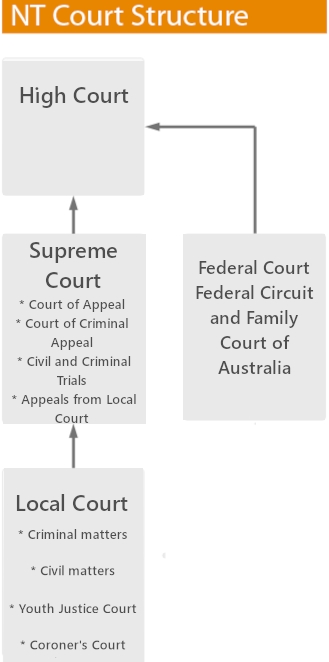About
Message from the Chief Justice
The Supreme Court of the Northern Territory of Australia is the superior Court of the Northern Territory. It exercises both original and appellate jurisdictions.
The Court consists of the Chief Justice, other Judges and the Associate Judge. Prior to appointment, they must have been admitted to practice in Australia for a period of not less than ten years or have been previously appointed as a Judge in an Australian Court. Provision is made for appointment of additional Judges and acting Judges, thus creating a pool of judicial officers which may be called upon as occasion requires.
The Court has jurisdiction in all matters, civil and criminal, which are not expressly excluded by statute. The Court does not have formal divisions, and the work of the Judges is shared between them as the Chief Justice directs. The jurisdiction of the Associate Judge is governed by Rules of Court.
The Role of the Supreme Court
Consistent with basic constitutional arrangements since the Act of Settlement of 1701, the Supreme Court comprises Judges and the Associate Judge who act independently of the political branches of Government, that is, the Legislative Assembly and the Executive comprising his Honour the Administrator and Ministers. Although the Court is truly an arm of Government it stands apart from the other two. The members of the Court are independent in the sense that subject only to the valid laws in operation in the Territory they are free to determine cases before the Court so as to do right to all manner of people according to law, without fear or favour, affection or ill will, in accordance with the judicial oath of office.
Judges are appointed by the Administrator until aged 75 and may only be removed from office by the Administrator on an address from the Legislative Assembly on the grounds of proved misbehaviour or incapacity.
The Associate Judge is also a member of the Court but ceases to hold office at age 72 and may only be removed from office by the Administrator if they become incapable of performing their duties or are guilty of misbehaviour. Members of the Court are not public servants.
The Northern Territory of Australia, the body politic under the Crown, in its various guises is the most frequent litigant in the Supreme Court. It is always concerned in the prosecution of criminal offences and is party to appeals from the Local Court and is often a party to civil litigation. Members of the public are invariably an opposing party. The fundamental importance of the independence of the judiciary from Parliament and Executive is therefore vital. It is charged with the responsibility of ensuring that government policies and actions are not contrary to law and of ensuring that citizen's legal rights and responsibilities are vindicated or enforced. It is up to the courts to protect the citizen against arbitrary and unlawful acts of the other arms of Government. Political control by the people is normally only exercised at election time. It is the courts alone which at all times have the function of standing between the government and the governed.
Criminal Trials
Except for certain minor indictable offences which may be dealt with summarily by the Local Court, the Court has exclusive jurisdiction over all indictable offences under the Territory and Commonwealth law. Criminal trials are heard before a Judge and Jury of twelve.
Civil Cases
All civil cases are heard by a Judge alone, although there is a limited power, rarely used, for trial by a Judge and Jury of four.
Appeals from Lower Courts
Appeals lay from the lower courts to a single Judge of the Court. The nature of appeal varies according to the terms of the statute creating the right of appeal.
Federal Jurisdiction
The Court has jurisdiction in most federal matters except where a federal court has exclusive jurisdiction. Sometimes the Commonwealth Act conferring jurisdiction on the Court provides for appeals from single judges of the Court to be heard exclusively by a Full Bench of a particular Commonwealth Court, e.g. the Federal Court of Australia, but usually appeals are heard either by the Territory Court of Appeal or Court of Criminal Appeal.
Case Flow Management
[Order 48] of the [Supreme Court Rules] provides for all civil matters to be managed by the Court. Cases are divided into categories, depending upon complexity, the likely length of the trial and urgency. Long or complex trials are allocated to a particular Judge who deals with all interlocutory matters at direction hearings which occur at regular intervals, and usually that Judge also hears the trial. A system of case management in criminal matters is also in place. The object of case flow management is to give the members of the court greater control of the progress of cases to trial.
Other Matters
Other matters preliminary to or consequent upon a trial are dealt with either by a Judge or the Associate Judge, as the case may be, usually in open court, either upon (usually) a summons or interlocutory summons.
Civil appeals from single judges are heard by not less than three Judges sitting as the Court of Appeal. Criminal appeals and references by the Attorney-General or by trial Judge are heard by not less than three Judges sitting as the Court of Criminal Appeal. The Court sometimes sits as a Full Court, usually of not less than three Judges, to hear special cases referred to it by a single Judge. The Full Court also sits in matters involving the admission or discipline of legal practitioners.
Appeals from the Court, the Court of Appeal or the Court of Criminal Appeal are heard by the High Court of Australia, but only after that Court has granted special leave to appeal.
